- Dr Awadhesh Dixit August 8, 2024
- Experiential knowledge is a must for 10+2 students to excel in their higher education and future endeavors August 8, 2024
DNP Education
Continue reading →

Education Jagat
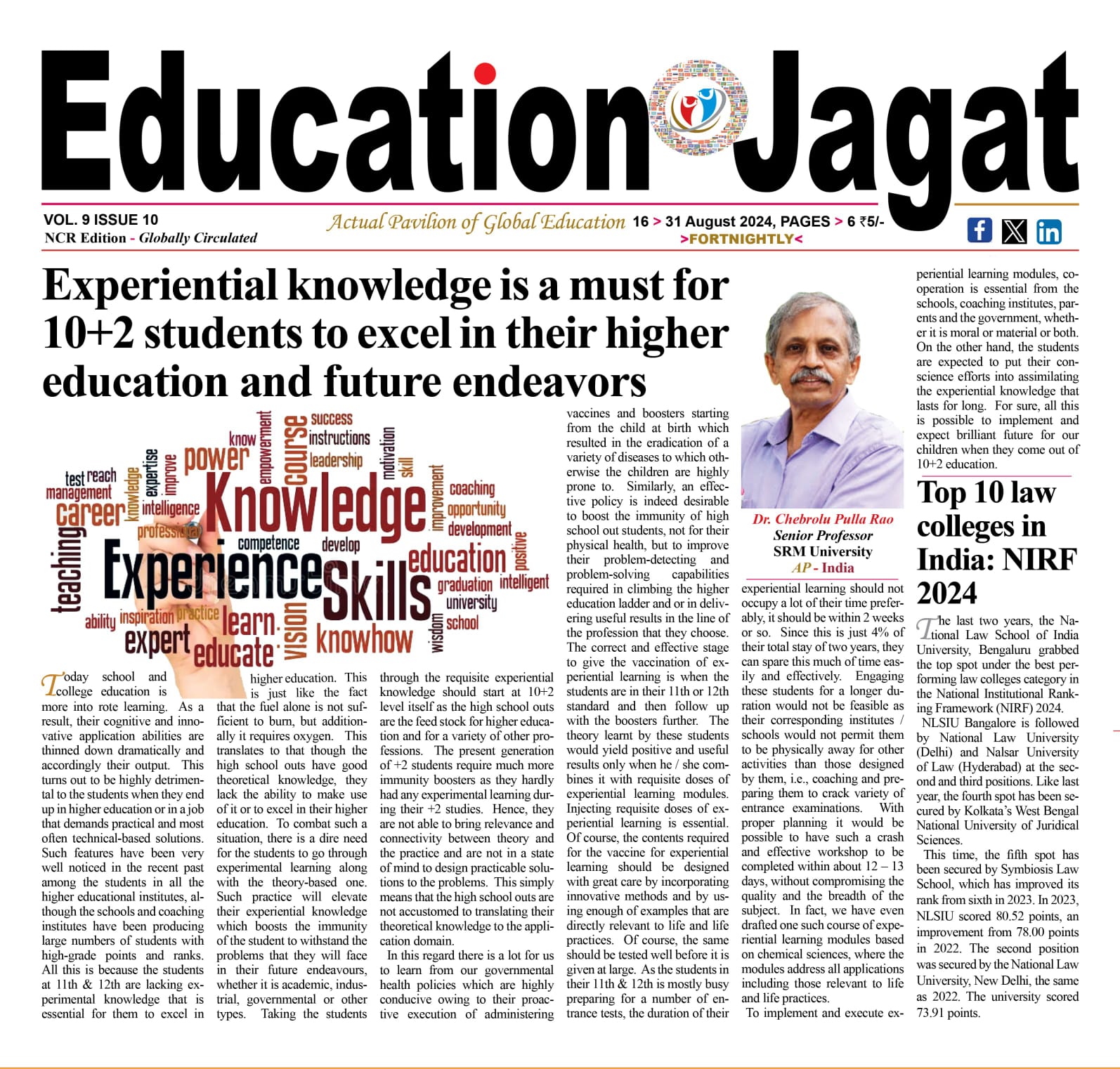
DNP India
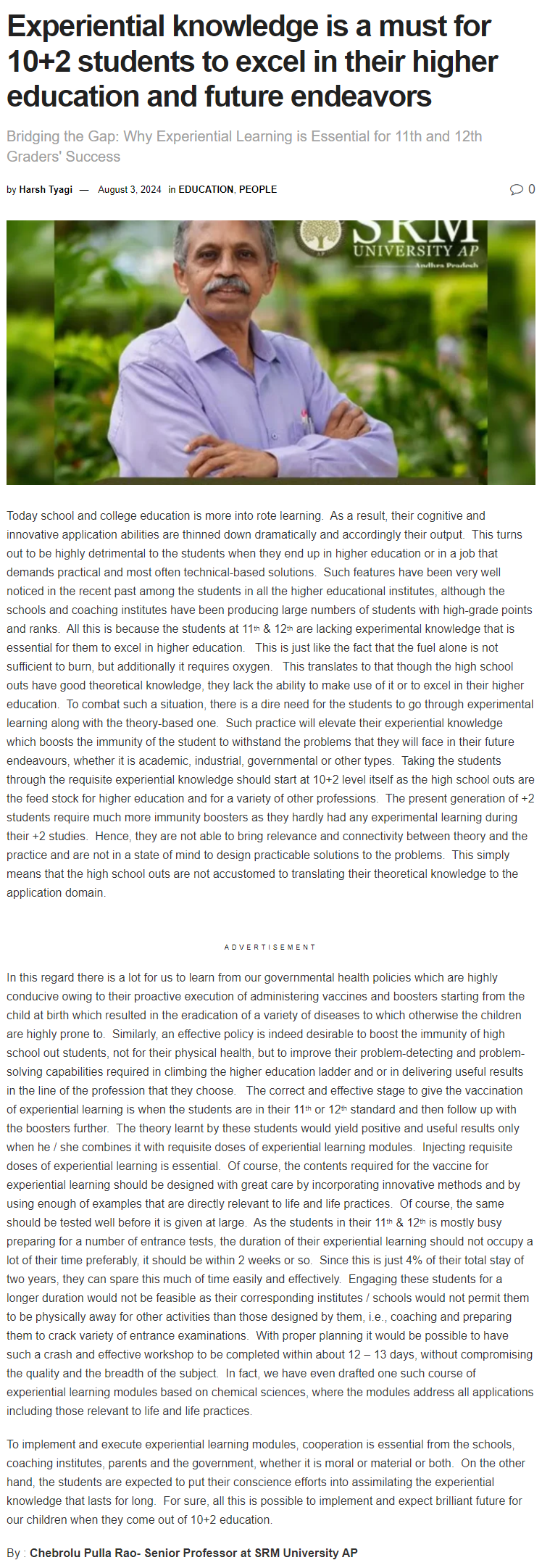
The Academic Insights
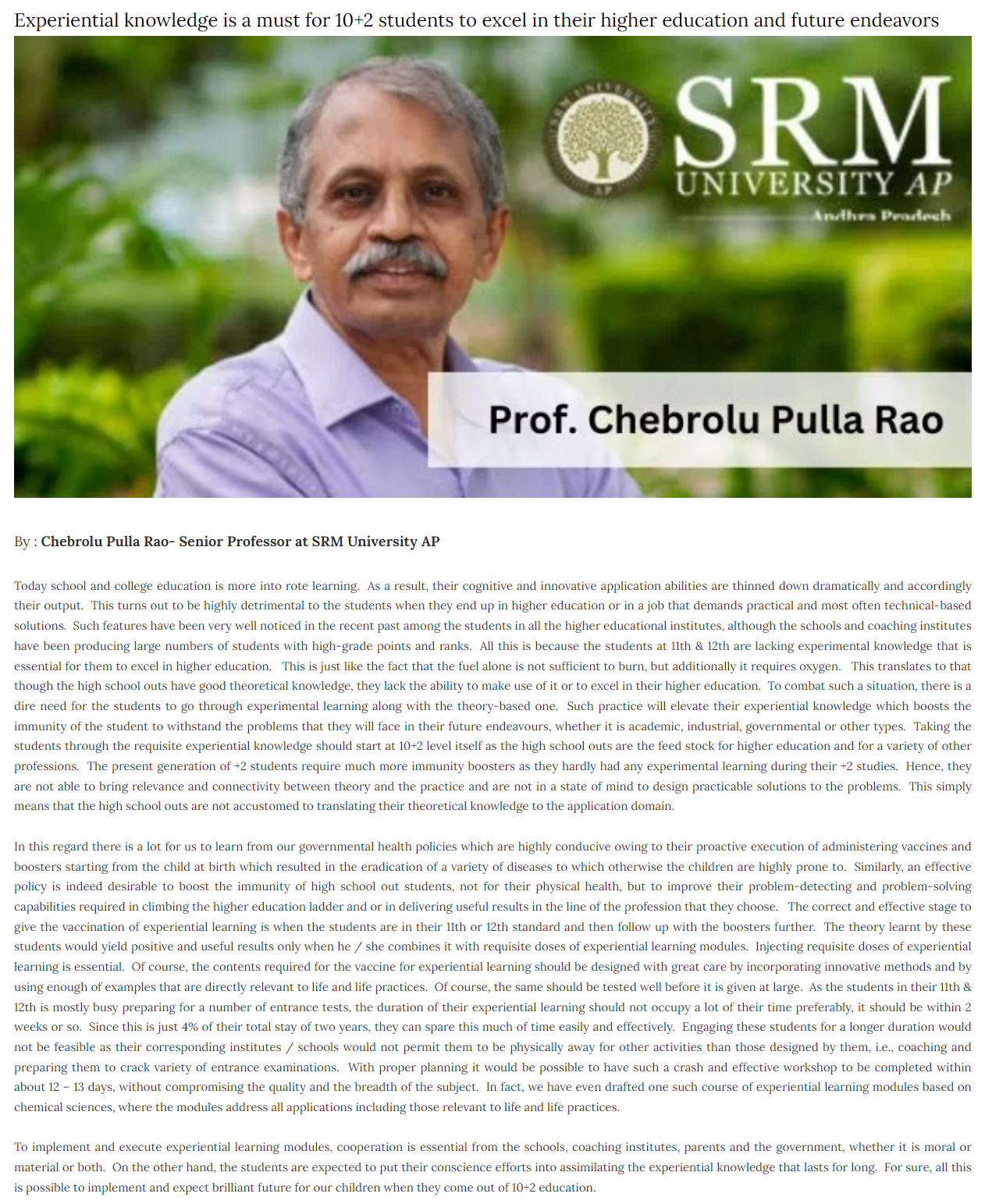
Education View Magazine
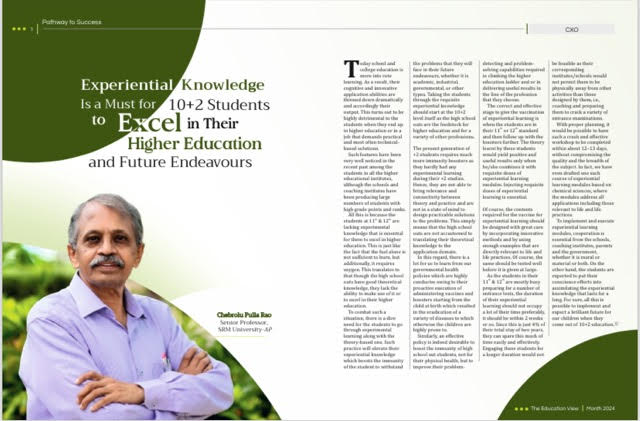
- Dr Devdutt Tripathi August 8, 2024
- Exploring Inventive Methods to Detect Microplastics in Contaminated Products August 7, 2024

The Department of Chemistry is glad to announce that Dr Rajapandiyan Panneerselvam, Associate Professor, Ms Jayasree K, Research Scholar, and Ms Mounika Renduchintala, BSc student, have had their breakthrough research published as a patent titled “A Method for Detecting Microplastics from Contaminated Products” with Application Number: 202441045388. Various research has been undertaken by scientists in developing improved methods for sample preparation and data analysis, aiming to reliably detect pollutants like microplastics in complex samples such as sea salt, soil, and water. In line with these efforts, this patent introduces a rapid and easy method to detect microplastics in contaminated products and water bodies using a filter paper-based substrate.
Abstract
Surface-enhanced Raman spectroscopy (SERS) has emerged as one of the most promising analytical tools in recent years due to its advantageous features, such as high sensitivity, specificity, ease of operation, and rapid analysis. These attributes make SERS particularly well-suited for environmental and food analysis. However, detecting target analytes in real samples using SERS faces several challenges, including matrix interference, low analyte concentrations, sample preparation complexity, and reproducibility issues. Additionally, the chemical complexity of pollutants and environmental factors can impact SERS measurements. Overcoming these hurdles demands optimized experimental conditions, refined sample preparation methods, and advanced data analysis techniques, often necessitating interdisciplinary collaborations for effective analysis. Therefore, our focus lies in the development of various methods for fabricating SERS substrates, pretreating analytes, and devising sample preparation strategies. These efforts aim to enable the detection of analytes like microplastics within complex real samples, including sea salts, soil samples, lake water, and various food products.
Practical Implementation/ Social Implications of the Research
SERS Community: Introducing a facile fabrication method for developing filter paper-based substrates, utilizing evaporation-induced self-assembly methods with the aid of 96-well plates. These substrates boast exceptional sensitivity and uniformity, exhibiting a relative standard deviation (RSD) of 8.2%. They offer easy fabrication and serve as effective SERS substrates for various applications.

Industry and Government Bodies: This invention plays a pivotal role in assessing contamination in food and water bodies, serving as a crucial tool in monitoring environmental contamination through on-site analysis with portable instruments. It ensures adherence to regulatory standards and safeguards public health.
Research: Beyond its practical applications, the invention supports scientific research endeavors focused on identifying microplastic contaminants in real-world samples using portable Raman spectrometers. This not only aids ongoing research but also paves the way for future studies in this critical field.
Collaborations
- Dr Hemanth Noothalapati – Raman Project Center for Medical and Biological Applications, Shimane University, Japan
- Dr Murali Krishna C – Advanced Centre for Treatment, Research and Education in Cancer, Tata Memorial Centre, Navi Mumbai, India
- Dr Soma Venugopal – University of Hyderabad, India
The research team hopes to develop a novel SERS substrate for the detection of environmental pollutants in real-world samples.
Continue reading → - Dr Vineeth Publishes Paper on Policy Responses to Caste Violence in Tamil Nadu August 6, 2024
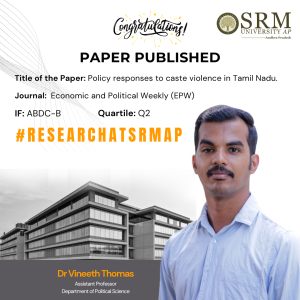 Dr Vineeth Thomas, Assistant Professor in the Department of Political Science, has recently published a paper titled “Policy Responses to Caste Violence in Tamil Nadu” in the esteemed journal Economic and Political Weekly (EPW). In the paper, Dr. Thomas offers valuable insights into the crucial issue of caste violence in Tamil Nadu and examines various policy responses aimed at addressing this complex societal challenge.
Dr Vineeth Thomas, Assistant Professor in the Department of Political Science, has recently published a paper titled “Policy Responses to Caste Violence in Tamil Nadu” in the esteemed journal Economic and Political Weekly (EPW). In the paper, Dr. Thomas offers valuable insights into the crucial issue of caste violence in Tamil Nadu and examines various policy responses aimed at addressing this complex societal challenge.
Dr Thomas’s research illuminates the dynamics of caste violence and provides a comprehensive analysis of the policy measures adopted to tackle this pressing issue. His work in the EPW is expected to significantly contribute to the discourse on caste-based conflicts and policy formulation in the region. The publication of this paper not only exemplifies Dr. Vineeth Thomas’s scholarly prowess but also underscores SRM University—AP’s commitment to fostering impactful research in the realm of social and political sciences. It is anticipated that this publication will stimulate further academic dialogue and influence policy considerations in the domain of caste relations and violence in Tamil Nadu.Abstract of the Research
This study examines the policy response to caste violence in schools in Tamil Nadu, particularly through the recommendations of a committee led by retired Justice K. Chandru. The committee’s report highlights pervasive caste discrimination in schools and proposes various measures, including teacher transfers, banning caste markers, and implementing orientation programs on caste-related issues. The report also suggests the establishment of School Welfare Officers and Social Justice Student Forces, along with a robust grievance redressal mechanism. Despite opposition and criticism, these recommendations represent a significant step toward addressing caste discrimination in Tamil Nadu’s educational institutions.Research in Layperson’s Terms
This research focuses on the problem of caste discrimination in schools in Tamil Nadu, India. Despite the state’s reputation for promoting social justice, caste-based violence still occurs, even among students. A committee led by retired Justice K. Chandru made several recommendations to address this issue, such as banning caste markers like wristbands and educating students and teachers about discrimination. The report also suggests having specific officers to ensure these measures are followed. While these recommendations aim to create a fairer school environment, their success depends on proper implementation and support from the community.
Practical Implementation and the Social Implications Associated
Implementing this research can lead to more inclusive and equitable school environments by eliminating caste-based discrimination. By enforcing bans on caste markers, educating students and teachers, and establishing grievance mechanisms, schools can foster a culture of equality, reducing social tensions and promoting a just society for future generations.
Collaborations
Electoral Politics
Future Research Plans
Indian govt and politics
Continue reading →

